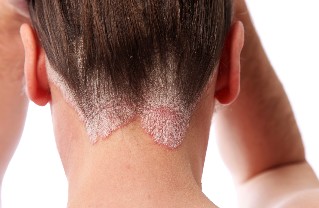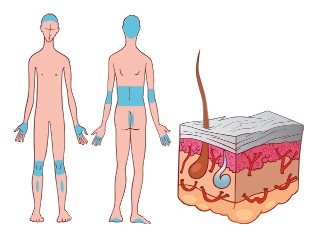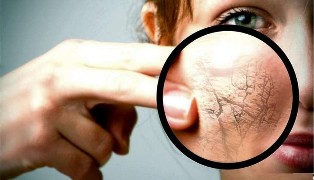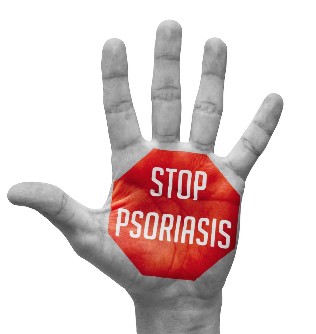
What is psoriasis
Psoriasis (psoriasis) is a non-infectious chronic disease of the skin, which manifests itself in the Form of flaking and breakouts on the skin. Shaped curve characterized by a shaft, with periods of Remission (improvement), and periods of exacerbations. The disease can develop at any age, but most commonly psoriasis affects people at a young age.
The intensity of psoriasis can vary greatly in the different phases. The disease affects only small areas of the skin or covering the whole body. Often the disease is progresses, and the patient reports that in the course of time (in the next period of exacerbation) psoriasis affects the large area of the skin. In addition to the skin, also select the psoriasis of the nails, the leaking in an isolated Form.
Psoriasis causes the disease
The cause of Psoriasis is unknown, but the disease immunological changes in the body (autoimmune Aggression), neurological diseases, metabolic disorders can trigger. The emergence of Psoriasis inheritance, decreased immunity to disease, Stress contribute.
Today, among the causes and factors of development of Psoriasis are the following:
- Hereditary predisposition (genetic theory of the development of Psoriasis). The likelihood of developing Psoriasis is higher if a Person has the next-of-kin also suffer from this disease. Maybe some groups of genes have to be responsible for the implementation of the psoriasis.
- Neuro-psychological overload (neurogenic theory of the development of psoriasis). It is known that Psoriasis can be triggered upheaval by a strong emotional. Stress serious factors in the development of this disease. In people with Psoriasis, Stress can be a cause of exacerbation of the disease.
- Hormonal Disturbances. Changes in the work of the endocrine glands could be the triggering mechanism in the development of Psoriasis.
- Metabolism (exchange of part of the theory of the development of Psoriasis). Problems with the metabolism of certain vitamins and trace elements (especially silicon), might contribute to the appearance of the psoriatic Plaques.
- Parasites. Considered parasitic theory of the development of Psoriasis, according to which the disease is of certain intestinal parasites. Numerous studies show that among people with psoriasis (Psoriasis), many media of different parasitic infections. As scientists believe, a special role in the development of the disease ascarids, Giardia Taurus can tsepen play and other. It is believed that the toxic products that these parasites secrete, are strong allergens, what is the cause of the imbalance and in the working of the immune system.
- Viral Infections.
And although the reasons for the development of Psoriasis is not clarified until the end, today, medicine is a well-known mechanism of the emergence of this disease. The basis of the formation of the Psoriasis rash is a disorder of the immune system. Immune cells that are aggressive against the own cells of the skin and leads to the formation of psoriatic Plaques.
Psoriasis Symptoms.
Psoriasis manifests emergence, resulting in a scaly patches, Plaques of red color, the itching. Spots often on the scalp, elbow joint, knee in the areas of the folds of the skin. To remove in the course of time, the superficial scales easily, in their place, you stay more flakes in the depth. With the progression of Psoriasis, the progression occurs the so-called phenomenon Kebnera: the appearance of Psoriasis Plaques in places of scratches or injuries to the skin.
Here are the symptoms, typical for the different types of Psoriasis:
- Psoriasis in the Form of Plaques , as seems to be more optimistic about the surface of the healthy areas of the skin red, inflamed, dry, thickened, hot skin, covered with silvery-white scales (Psoriasis Plaques). The skin in these areas are prone to chipping. In the place of the skin from rose to red pockets, the slightly injured and bleeding. Psoriatic Plaques usually merge with each other, the increase in the size and forms plates Plaques ("Paraffin-lake"). In Psoriasis flexor surfaces of the shell weak. In red spots, the wrinkles in the skin (groin, the area of the external genitalia, the armpits, the inner surface of the thighs, belly wrinkles,).
- Guttate Psoriasis is characterized by a variety of dry, small, red or purple lesions, raised above the surface of the skin, under the Form reminding the tears or circles. These items are surprisingly large areas of the skin. Guttate Psoriasis often develops after a streptococcal infection (such as sore throat or neck pain).
- Pustular Psoriasis looks as optimistic on the surface of intact skin vesicles with clear content. Pustules surrounded by a red edematous skin, which flakes off easily. Psoriasis of the nails is characterized by a color change of the nails, the nail bed, the appearance of spots, a transverse isčerčennosti detect on the nails, thickening of the skin around the nail bed, thickening and stratification of the nail, the complete loss of the finger nails.
- Psoriatic Arthritis is accompanied by inflammatory processes in the joints and connective tissue. Psoriatic Arthritis usually affects the small joints of the phalanges of the fingers, feet, caused the psoriatic dactylitis. Erythrodermic Psoriasis manifests in common desquamation and inflammation, detachment of the skin on the large surface of the body, swelling, pain of skin, intense itching.
Among the other symptoms of psoriasis:
- the bleeding area on the skin;
- the emergence of erosions and pitting on the nails;
- severe itching;
- Pain in the joints and swelling.

Classification of psoriasis
Distinguish the following types of Psoriasis:
- vulgar (or vulgaris), psoriasis;
- exudative Psoriasis;
- arthropathic Psoriasis;
- erythrodermic Psoriasis;
- Psoriasis of the palms and soles of the feet;
- Pustular Psoriasis.
Psoriasis runs in three stages:
- Progressive stage of Psoriasis. This is the first stage of the disease, characterized by an escalation, an increase in the quantities of fresh lesions.
- The stationary Phase of Psoriasis. This period is characterized by the preservation of the existing disease. Skin rashes and other symptoms of Psoriasis is not more and not less.
- Phase Psoriasis the retreat. This is the last stage of the disease, in which rashes are missing.
Depending on the prevalence of the pathological process in Psoriasis is:
- limited – hit small parts of the body;
- community – propose significant parts of the body;
- generalized strikes almost the whole body.
Depending on the season, if the disease escalates, psoriasis happens:
- Winter – worsening of psoriasis usually occurs in the cold season;
- Summer – exacerbation of Psoriasis occurs in the summer;
- uncertain – when the periods of exacerbation of Psoriasis is not associated with any season of the year.
Diagnosis of psoriasis
Determined, the disease skin doctor on the basis of the typical clinical picture. For further diagnosis of skin biopsy.
Actions of the patients
You can take a sun bath within 15 minutes a day. You should not drink alcohol, avoid Stress, watch your weight to lead a healthy life style and properly care for your skin.

Psoriasis Treatment
For the therapy of Psoriasis extenuating means of drugs, restoration of the stratum corneum, topical preparations (ointments, lotions, creams) used with a content of glucocorticoids (hydrocortisone, prednisone, dexamethasone), drugs containing pyrithione zinc, ointments containing Vitamin D3 analogues, tar, naphthalan, hydroxyestrone. In severe forms of Psoriasis, the ineffectiveness of the external therapy that he is more than 20% of the surface of the skin, systemic drug therapy, the benefits, cytotoxic drugs (methotrexate), synthetic retinoids (Retinol acetate, Retinol palmitate, tretinoin), glucocorticoids, Multivitamin (aevitum, etc.) administered.
A special role in the treatment of psoriasis must be discharged without risk of some biologically active substances, including, it should be noted:
- Silicon. In recent years, doctors are increasingly talking about the role of silicon in the development of Psoriasis. A component of the Psoriasis treatment are medications and Vitamin-Mineral complexes contain silicon. On the one hand, silicon improves the skin, and on the other hand, acts as a sorbent, the Savior of the antigens that play a role in the development of Psoriasis.
- Vitamin D. it is well known, one of the most important minerals, for successful control of Psoriasis, is a calcium. However, for the normal Absorption of Calcium Vitamin D. the best supplements containing Vitamin needs, enable D, after you get the back upright of the active Phase in the stationary Psoriasis.
- Fish oil and Omega-3 acids. For the elimination of the inflammation in Psoriasis have to the entrance in the organism polyunsaturated Omega-3 fatty acids, which in large quantities in fish oil are included.
- Lecithin. This substance is necessary for a rapid restoration of the epithelial cells, which die with psoriasis. Drugs with Lecithin allow to cope faster with the inflammation and restore the integrity of the skin.
Non-drug therapy consists of systemic photochemotherapy: exposure to ultraviolet light with a wave length of 320-400 NM on the backdrop of the admission of photosensitizers (PUVA-therapy). Also use cryotherapy, plasmapheresis.
The Patient must follow a special diet. Diet for psoriasis should be balanced. The Patient should from the diet of refined products, spicy foods and sweets. We need to carefully monitor your health and prevent colds, because any violation of the immunity can trigger the development of the disease.
Complications
Among the possible complications Arthritis, Depression caused by low self-esteem.

Prevention of Psoriasis
To prevent diseases is impossible, but there are techniques that make it possible to weaken the symptoms of Psoriasis and reduce the number of exacerbations. They protect the skin from drying out, avoid a long stay in the sun, try not to injury the skin. Avoid stressful situations, infections, medication, Smoking, the symptoms of Psoriasis (for example, β-blockers, Lithium), stop alcohol consumption limit. And remember that treatment of Psoriasis should be left to professionals. Psoriasis-home treatment, and any type of self-medication of this disease are not permitted.

























